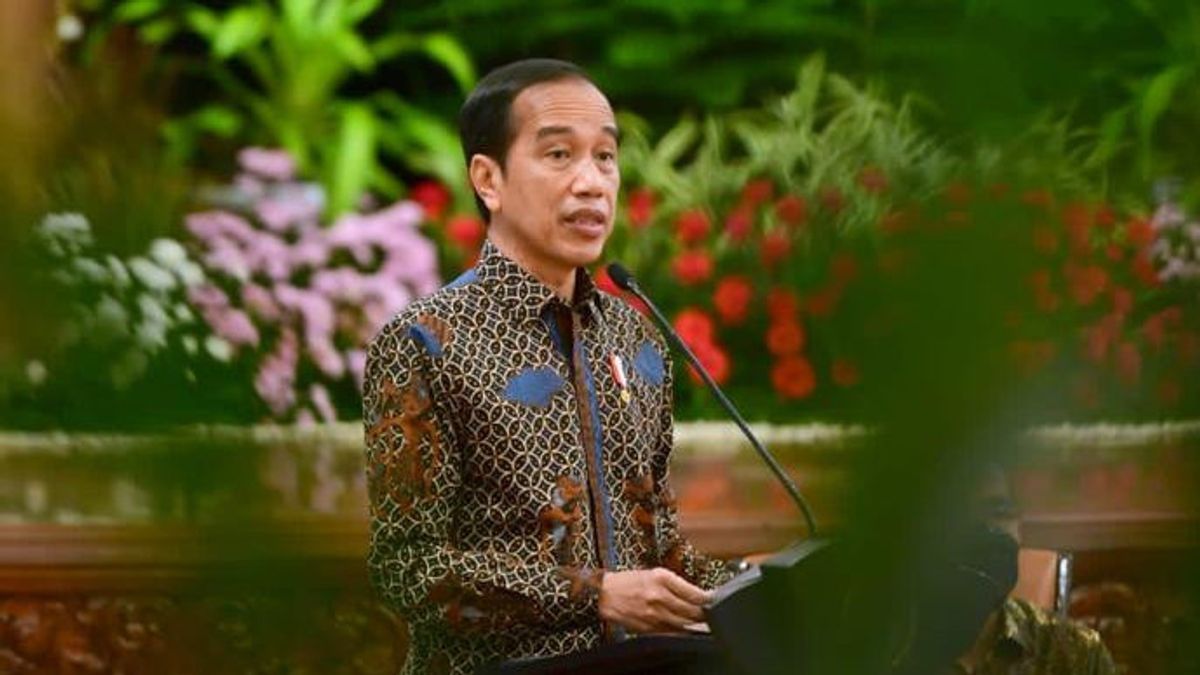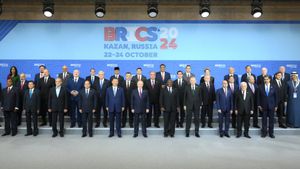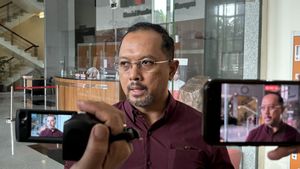JAKARTA - President Joko Widodo admits that he clearly thinks about the problem of inequality in land ownership in Indonesia. This was in response to criticism from the Deputy Chair of the Indonesian Ulema Council (MUI), Anwar Abbas, who questioned the land ratio Gini index which he said was concerning.
"Yes, me too, did you think I didn't think about it? The Gini Ratio when I entered was more than 0.41. Ladies and gentlemen. That's the gap that came to mind. Don't think I didn't think about it! right," said Jokowi in his remarks at the 2nd MUI Community Economic Congress on Friday, December 10.
Jokowi again conveyed the promise of Agrarian Reform and the revocation of all Cultivation Rights (HGU)/Building rights (HGB) abandoned by entrepreneurs to be distributed to other parties. The new agency for the Land Bank, said Jokowi, was ready to accommodate the abandoned HGU/HGB.
"If there are ladies and gentlemen who need a very large amount of land, please tell me, I will find it, I will prepare it, how much? Ten thousand hectares, not square meters, hectares, fifty thousand hectares? But with a visible calculation of the proposal, it means that there is a clear visibility study that the land will be used, I will give it because I have the materials," he said.
Responding to the statement, the Secretary-General of the Consortium for Agrarian Reform (KPA) Dewi Kartika views the source of the problem of inequality in land ownership and agrarian conflicts in Indonesia is the control of the land on an extraordinary scale by plantation corporations.
This ownership is facilitated by the government through the issuance, extension, or renewal of the HGU, as well as the omission of the neglect. Therefore, Dewi said that her party had eight critical notes to Jokowi.
First, Dewi considers that during Jokowi's six years in charge, there have been no serious steps to implement agrarian reform.
"Throughout 2015 to 2020, there have been 2.291 eruptions of agrarian conflicts in all provinces, where during this period, the highest contributors to agrarian conflicts were plantation companies due to HGU," said Dewi in her statement, Thursday, December 16.
Second, the control of abandoned land on HGU and building rights (HGB) from the beginning of the government should have been carried out and become concrete and systematic priority for settlement by Jokowi.
"Unfortunately during the Jokowi era, the plan for land redistribution for farmers and the resolution of agrarian conflicts from the control of abandoned lands and problematic HGUs was drastically reduced to only 400 thousand hectares.
Third, Jokowi, in his statement, reflects as if landowners can simply accept large-scale land requests, as long as the applicants for abandoned land have a clear visibility study.
"This is where the crucial problem lies, because those who will get the lands resulting from the control of abandoned lands are again groups that have access to capital, master technology, and markets. will monopolize the land," explained Dewi.
Fourth, Jokowi said that all abandoned land would be collected and included in the land bank (BT) scheme. This, according to Dewi, actually reaffirms that the orientation of controlling abandoned HGU/HGB is not for the small people, but is strongly business-oriented and in favor of big investments.
"Agrarian reform should not be aligned with the land acquisition process for business orientation and major investment," said Dewi.
Fifth, when Jokowi wants to solve the problem of inequality in land ownership, he must stop the process of granting, extending, or renewing the HGU, which has been lingering in the circle of entrepreneurs and companies.
Sixth, the most important priority of allocating the results of controlling abandoned land and problematic HGUs must be aimed at the agenda of resolving structural agrarian conflicts and redistribution of abandoned land for the benefit of the small people.
"The president is not allowed to sell back abandoned lands of former HGU/HGB, which are the cause of inequality and poverty to certain groups which will again result in inequality in the agrarian structure," she said.
Seventh, Dewi considers that the government must direct its thoughts and action plans on how controlling abandoned land can reduce the inequality of land tenure that occurs, inequality in access to capital, technological inequality, and market guarantees experienced by the people.
Eighth, he continued, Jokowi needed to replace the events for handing over the land certificates, with the release and release of villages, villages, productive rice fields and gardens, grazing fields, people's ponds, public facilities, and community social facilities from HGU/HGU claims the abandoned HGB.
"In this way, efforts to control abandoned HGU-HGB, which expire or cause agrarian conflicts, are really aimed at recognizing and restoring the people's constitutional rights to land," he concluded.
The English, Chinese, Japanese, Arabic, and French versions are automatically generated by the AI. So there may still be inaccuracies in translating, please always see Indonesian as our main language. (system supported by DigitalSiber.id)













